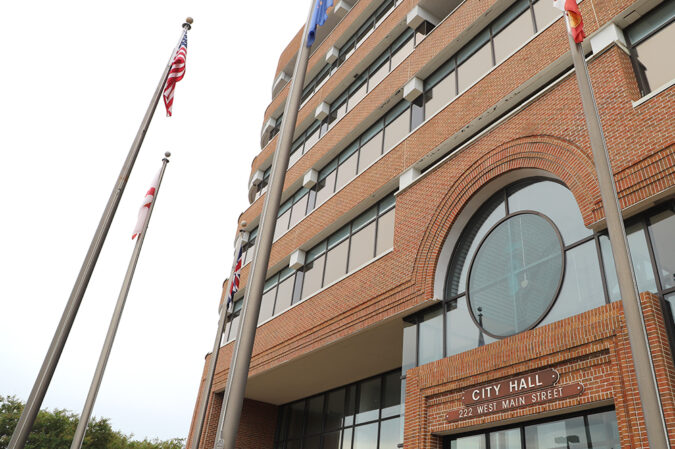
by Jeremy Morrison
Pensacola Mayor Grover Robinson has some time left in office, but he’s already onboarding mayor-elect D.C. Reeves, who was elected in August as the city’s next mayor.
“I’ve gone from actually doing to being responsible for training people who are going to be doing, and I think that’s exciting,” Mayor Robinson said Monday. “I think that’s a natural progression of life, and I’m excited to see what the next generation does. And I have all the confidence in the world that Mayor-elect Reeves and the team that we have here will be very successful.”
With about two months to go before taking office, Reeves has begun getting comfortable in Pensacola City Hall, meeting with administrative staff, as well as other departments, such as the city’s police and fire protection workers. On Monday, the mayor-elect attended Robinson’s weekly mayoral press conference.
“This is not something that he has to do; this is not required of him,” Reeves said, thanking the mayor for taking the time to help him get acquainted with the particulars of municipal government. “I could show up here on November 22, 23 and start fresh from there, so I’m very appreciative, Mayor Robinson, for letting me get in here and learn as much as I can.”
Since winning the election, Reeves told members of the media that he has worked to learn as much as possible about Pensacola’s government, the city’s current priorities, and the charted course.
“My joke is, I want to download. Just tell me where we are as we sit today and what’s coming up,” mayor-elect Reeves said.
While Reeves does not have any previous experience holding public office, he did serve as staff for Mayor Robinson’s transition team when the current mayor took office four years ago. The transition team concept — tapping various community members to delve into various issues on an incoming mayor’s behalf — is one that the new mayor plans to employ and use to inform his direction.
“You know, we all come in with opinions, what should be prioritized, and what’s important,” Reeves said. “I think that having a lot of smart people in a room that understand and have a mastery of very important issues is something that any mayor, that any citizen in our community, really, could gain a lot of value from.”
Mayor Robinson reflected that many of the assessments and priorities presented to him by his transition team ultimately were absorbed into his mayoral platform and initiatives — “I think it’s a great process; it really gave us many of the things that we set out to do” — and that one of the needs identified by the team and effort ultimately focused on by Robinson was the assemblage of an effective administrative team.
“I think that when D.C. comes in here, he’ll be inheriting one of the best public service teams you’ve got,” Robinson said. “We have an incredible team that we’ve put together.”
When looking at his efforts and accomplishments, the mayor said he felt comfortable leaving his legacy in Reeves’ hands.
“You can’t solve everything, and sometimes you have to leave some of those things to be solved by good people who come behind you,” Robinson said.
Port of Call
City officials have big dreams for the Port of Pensacola, and soon the city will request millions of dollars in oil spill restoration money to fund those dreams.
“We believe the port can be a viable engine for job growth and diversification and creating amenities,” Mayor Robinson said Monday.
The mayor outlined an upcoming request to Triumph Gulf Coast, which oversees the dispersal of funds associated with environmental penalties stemming from the 2010 Deepwater oil spill in the Gulf of Mexico. The request, for up to $50 million, would go to help fund additions at the port that would support marine research operations, as well as potentially U.S. Sailing, which has expressed interest in developing a home port in the city as the team trains for the American Cup.
“I think that would be a tremendous opportunity for us to be the sailing research center for the United States, and at that point, we’d probably be the Western Hemisphere of sailing capital, that would be huge if we were able to make that happen,” Mayor Robinson said.
The mayor stressed that such a “truly transformational” shift of focus at the port — from a more working-port focus to one leaning into more non-traditional uses — could usher in a new era for the facility, as well as help further define the site’s relationship to a evolving downtown landscape: “It will complement, it won’t interfere with downtown, it will complement downtown and we’ll continue to see downtown’s success.”
“Our port is not going to be like everybody else’s port, and that’s ok” Robinson said. “We can still have a very viable port that generates great economic opportunity for this community and still be a port. But it’s going to be different. I don’t want to be Miami’s port, I don’t want to be Savannah’s port, I don’t even want to be Panama City’s port, I want to be Pensacola’s port.”



